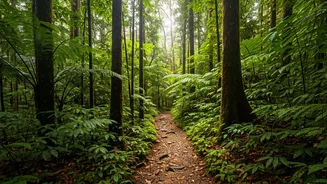Preparing for Gabon
Before venturing into the Gabon rainforest, meticulous preparation is crucial. This involves gathering essential supplies and understanding the local conditions.
First, consider the weather, which can vary significantly depending on the time of year. Pack lightweight, breathable clothing, and sturdy, waterproof hiking boots. Include insect repellent to ward off mosquitoes and other biting insects, as well as sunscreen to protect your skin from the sun. A first-aid kit containing necessary medications, bandages, and antiseptic wipes is indispensable. Ensure all vaccinations are up-to-date and consult a healthcare professional regarding any necessary precautions. Additionally, research the specific area you plan to visit, including trail difficulty, potential wildlife encounters, and any permits or permissions required. Consider the level of physical fitness needed and gradually build up your endurance before embarking on the trek. Finally, arrange for reliable transportation to and from the rainforest and consider hiring a local guide who possesses invaluable knowledge of the terrain and wildlife.
Essential Safety Measures
Safety should be your top priority when trekking in Gabon's rainforest. Start by informing someone about your itinerary, including your planned route and expected return time. Carry a fully charged mobile phone or satellite communication device for emergencies, and be familiar with the local emergency contact numbers. Always travel with a companion, as this enhances safety and provides assistance if needed. Be vigilant about wildlife encounters; maintain a safe distance from animals and avoid feeding them. Learn about the local flora and fauna to recognize potential hazards, such as poisonous plants or dangerous insects. Carry sufficient water to stay hydrated and avoid drinking water from natural sources unless you know it has been purified. Use a map and compass, or a GPS device, to navigate and stick to marked trails to prevent getting lost. If you encounter any unexpected weather changes, such as heavy rain, seek shelter immediately. Lastly, follow the principle of leaving no trace by packing out all trash and minimizing your impact on the environment.
Navigating the Trails
Successfully navigating the trails in Gabon's rainforest demands a blend of preparation, awareness, and respect for nature. It is essential to be familiar with the trail markings and follow designated paths. Start your trek early in the morning to avoid the heat of the day and allow ample time to reach your destination before dusk. Regularly check your position on the map and correlate it with landmarks and trail markers. Be prepared to deal with varied terrain, including uneven ground, muddy sections, and stream crossings. Wear appropriate footwear with good ankle support and traction to prevent slips and falls. Move slowly and observe your surroundings, watching for wildlife and potential hazards. When crossing streams, assess the water's depth and current before entering; use a walking stick for balance if needed. Be mindful of the environment and avoid disturbing the natural habitat. Avoid touching plants or branches along the trail to prevent contact with insects or poisonous substances. Lastly, always be aware of the changing conditions and be ready to adapt your plans if necessary, such as altering your route due to weather or unforeseen circumstances.
Wildlife Encounters & Awareness
Gabon's rainforest is teeming with unique and diverse wildlife, making wildlife awareness vital for a safe and enriching experience. Learn to identify common animals in the region and recognize signs of their presence, such as tracks, droppings, and feeding areas. Maintain a respectful distance from all wildlife and never approach or attempt to feed them. Observe animal behavior and be aware of their potential reactions to your presence. If you encounter a dangerous animal, remain calm, move away slowly, and avoid direct eye contact. Carry binoculars to observe wildlife from a distance without disturbing them. Be particularly cautious in areas known to be frequented by specific animals, such as elephants, gorillas, or chimpanzees. Listen for sounds of wildlife, as they can alert you to the presence of animals. Educate yourself on the local wildlife regulations and guidelines, respecting park rules, and avoiding any actions that could harm animals or their habitats. It's imperative to always carry a wildlife deterrent, such as bear spray, and know how to use it. Remember that you are a visitor in their environment, and your responsible behavior helps preserve wildlife for future generations.














